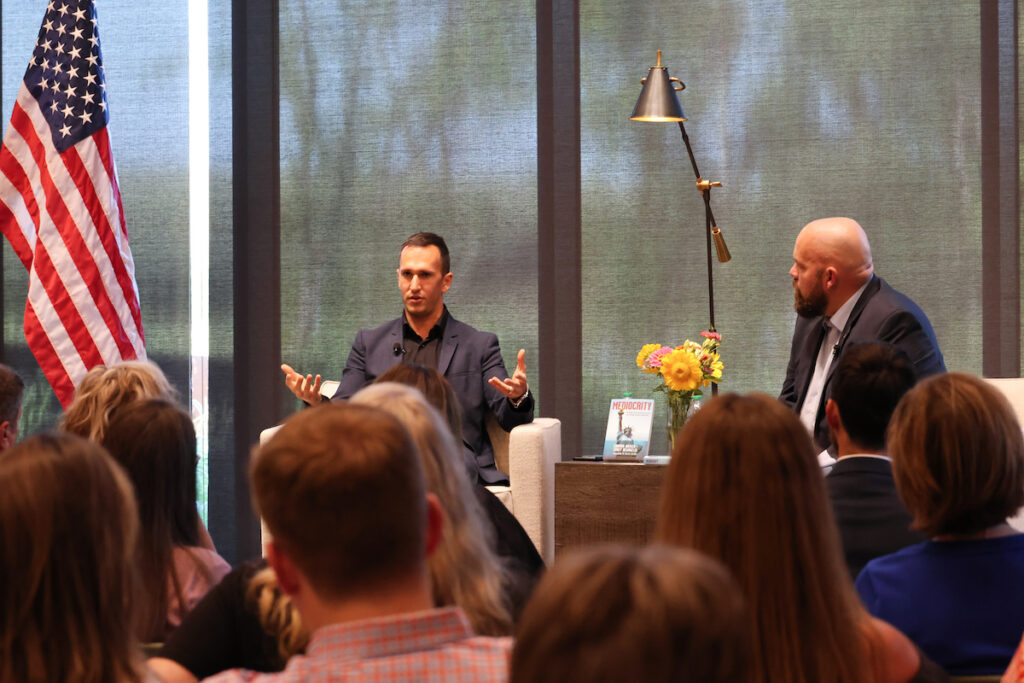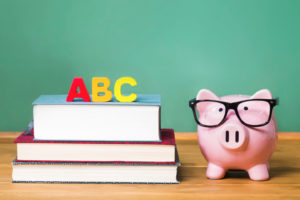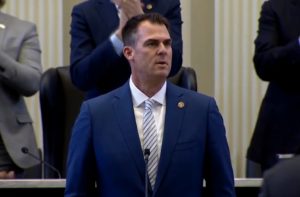Education expert Corey DeAngelis warns the nation’s ‘rising tide of mediocrity’ in public education has become a tsunami, in live interview at Herzog
The danger to our children and our country from a failing education system has only mushroomed through the years, a new book urgently warns.
Indeed, four decades after our being apprised of…

The danger to our children and our country from a failing education system has only mushroomed through the years, a new book urgently warns.
Indeed, four decades after our being apprised of a “rising tide of mediocrity” in public education comes a new alarm: most Americans simply don’t know the extent to which the rising tide has become a tsunami engulfing our young.
Such was the clamorous alert sounded Friday night at the Herzog Foundation, publisher of The Lion, by education expert Corey DeAngelis, co-author of the stunning new book, Mediocrity: 40 Ways Government Schools are Failing Today’s Students.
DeAngelis, a senior fellow at the American Federation for Children and executive director at Educational Freedom Institute, co-wrote the book with Connor Boyack, president of the Utah-based Libertas Institute.
Mediocrity takes its name from the Reagan-era report A Nation at Risk – published exactly 40 years before the book’s release earlier this year – which warned back in 1983, “The educational foundations of our society are presently being eroded by a rising tide of mediocrity that threatens our very future as a nation and a people.”
That rising tide of mediocrity, the book’s description says, “has created a tsunami of low expectations and poor performance, suggesting the need for alternative solutions.”
Problem is, the book notes, most people simply don’t know how mediocre American education has become.
“Despite a general recognition that America’s schools are in a sad state,” the authors write, “too many parents and grandparents are unaware of just how pervasive the problems are. They may be concerned about the rising tide of mediocrity but unaware just how badly the educational foundations have eroded in recent years.”
In his on-stage interview Friday in front of an audience of 100, DeAngelis wondered aloud why people would support housing vouchers and other government aid that respects people’s individual choices, but not for education. Moreover, he said, Gallup recently found that only 26% of Americans have confidence in the public school system, an all-time low, with only 9% of Republicans claiming confidence in it.
Noting that American Federation of Teachers President Randi Weingarten inexplicably visited Ukraine “to assess the situation” there, DeAngelis quipped, “Haven’t Ukrainian children had it bad enough?”
Interviewer Chris Stigall further wondered why anyone would protest DeAngelis’ message of education freedom. The reason, DeAngelis responded, is that school choice is winning – in nine states in particular that went “all-in” on choice in the past two years.
“The left is losing control of the minds of other people’s children, and they’re losing their minds over it,” he said.
Mediocrity offers 40 startling examples of the public education system’s failures, in 40 compact chapters that Daily Signal columnist Tony Kinnett calls “a concise explanation for why Americans have begun abandoning the woefully inept public school system.”
As Kinnett points out, Mediocrity is neither an emotional rant nor a rejoinder to “the aggressive and often petty anti-school choice movement.” Instead, it’s a scholarly, while approachable, recitation of statistics and stories that present a clear-eyed view of the mess our schools are in – from plummeting performance to socially, scientifically and morally contrived notions of gender identity and sexuality.
The book, writes Kinnett, offers “case after case of sexual abuse, academic inaction, hemorrhaging budgets, political strong-arming, and a lack of vision” that “showcase a public education environment that is anything but beneficial for the students of the best nation on Earth.”
“The government’s cruel response in managing its schools during and after COVID-19 set back the educational progress of many students,” the book recounts. “‘Two weeks to slow the spread’ became two years to increase mediocrity for millions of students.”
As for rampant, often wildly age-inappropriate sexual indoctrination in public schools, the authors conclude, “What was once a goodwill gesture of homosexual and heterosexual children befriending one another has now been co-opted into a breeding ground for radical left-wing teachers to promote gender discussion and dysphoria among highly impressionable children, even at very young ages, without their parents having any knowledge about or say in the matter.”
Yet, even as the Biden administration demonizes concerned parents as “domestic terrorists,” it’s not a matter of opinion as to what actually works best, the book argues.
“Research confirms what we all implicitly understand to be true: more parent engagement in a child’s school experience leads to improved educational outcomes.”
Meanwhile, a lack of competition in education not only tamps down achievement but diminishes the role and vital contributions of parents, the authors maintain.
“When a school has a monopoly on its students, the incentive to produce excellence is diminished. And the absence of competition in education can lead to parents being viewed as a nuisance rather than valued clients who may seek alternatives if they are not satisfied. … If we want to fix the current mediocrity, we have to dismantle the monopoly.”
The good news, they write, is that alternatives to public education are budding every day.
Indeed, DeAngelis told the Herzog audience that Republican legislators need to follow the party platform to educational freedom; governors need to lead on the issue, as those in Iowa and Arkansas recently have; and school choice proponents need to vote and make sure their leaders hear from someone other than self-interested educrats in favor of the status quo.
Parents badly outnumber them, he noted. As opposed to the teachers’ unions, he said, parents are the “kids’ union.”
Kids’ advocates can also visit the AFC site, where they can find myths about school choice and how to refute them.
“It has never been easier to step off the government school conveyor belt and explore other paths,” Boyack and DeAngelis write in the book’s conclusion. “Whether you choose private schools, microschools, homeschool co-ops, online learning, tutoring, cloud-based classrooms, or another option in a quickly evolving landscape of education entrepreneurship, there are solutions out there for every child.”
DeAngelis has authored or co-authored over 40 journal articles, book chapters and reports on education policy, and is the co-editor of School Choice Myths: Setting the Record Straight on Education Freedom. Connor Boyack is author of the popular Tuttle Twins book series for kids.
Mediocrity is published by Libertas Press and is available for purchase online. Former Secretary of Education Betsy DeVos writes the forward, and the book has also received endorsements from Glenn Beck, Pete Hegseth and Christopher Rufo.



